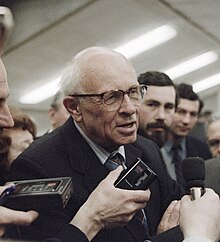Andrey Sakharov
| Andrei Dmitrievich Sakharov | |
|---|---|

Sakharov at a conference of the USSR Academy of Sciences on 1 March 1989
|
|
| Native name | Андрей Дмитриевич Сахаров |
| Born |
21 May 1921 Moscow, Russian SFSR |
| Died | 14 December 1989 (aged 68) Moscow, Russian SFSR, Soviet Union |
| Residence | Moscow, Russian SFSR, Soviet Union |
| Citizenship | Soviet |
| Fields | Nuclear physics |
| Alma mater | |
| Known for | |
| Notable awards |
|
| Spouse |
Klavdia Alekseyevna Vikhireva (1943–1969; her death) Yelena Bonner (1972–1989; his death) |
Andrei Dmitrievich Sakharov (Russian: Андре́й Дми́триевич Са́харов; 21 May 1921 – 14 December 1989) was a Russian nuclear physicist, Soviet dissident, an activist for disarmament, peace and human rights.
He became renowned as the designer of the Soviet Union's RDS-37, a codename for Soviet development of thermonuclear weapons. Sakharov later became an advocate of civil liberties and civil reforms in the Soviet Union, for which he faced state persecution; these efforts earned him the Nobel Peace Prize in 1975. The Sakharov Prize, which is awarded annually by the European Parliament for people and organizations dedicated to human rights and freedoms, is named in his honour.
Sakharov was born in Moscow on May 21, 1921. His father was Dmitri Ivanovich Sakharov, a private school physics teacher and an amateur pianist. His father later taught at the Second Moscow State University. Andrei's grandfather Ivan had been a prominent lawyer in the Russian Empire who had displayed respect for social awareness and humanitarian principles (including advocating the abolition of capital punishment) that would later influence his grandson. Sakharov's mother was Yekaterina Alekseyevna Sakharova, a great-granddaughter of the prominent military commander Alexey Semenovich Sofiano (who was of Greek ancestry). Sakharov's parents and paternal grandmother, Maria Petrovna, largely shaped his personality. Although Sakharov's paternal great-grandfather had been a priest in the Russian Orthodox Church, and his pious mother had him baptised, Sakharov was an atheist in later life. However, he did believe that a "guiding principle" governed the universe and human life.
...
Wikipedia
